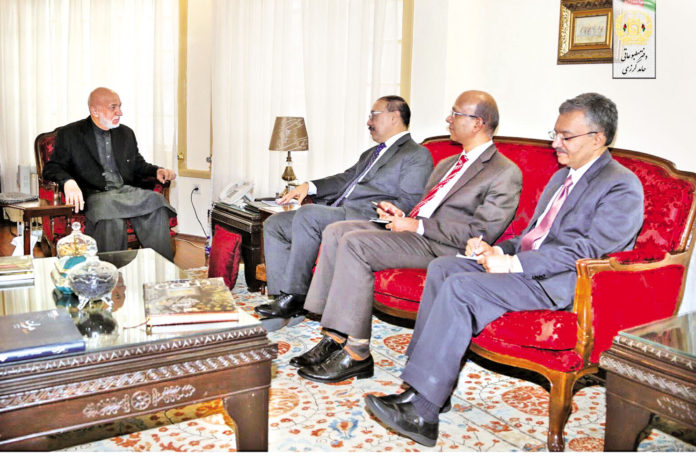
In a guarded reaction to the peace deal between the US and the Taliban, India said its consistent policy has been to support all opportunities that can bring peace, security and stability in Afghanistan and ensure end of terrorism “and lead to a lasting political settlement through an Afghan led, Afghan owned and Afghan controlled process”.
Significantly, describing Afghanistan as a contiguous neighbour (given India’s claim over PoK), the government said India will continue to extend all support to Afghan government and people in realising their aspirations for a peaceful, democratic and prosperous future where interests of all sections of Afghan society are protected.
“India remains committed to economic and human resource development partnership with Afghanistan. Foreign Secretary reiterated India’s support for Afghan-led, Afghan-owned and Afghan-controlled peace process which results in enduring and inclusive peace and reconciliation in Afghanistan. They agreed that sustainable peace, stability, and prosperity in Afghanistan requires cessation of external support for terrorism and commitment to regional connectivity and integration,” MEA Spokesperson Raveesh Kumar said.
Historically, India had a strong relationship with Afghanistan and has, indeed, been involved in various infrastructure and humanitarian projects. However, it finds itself without a seat at the table in the talks that determine the country’s future. While Pakistan, too, was not part of the discussions, its role in the creation and nurturing of the Taliban leadership is well established. While the Taliban have made reassuring noises, the apprehension of an increase in militant penetration into India is well-founded.
Peace in Afghanistan and the prosperity of its people are in India’s interest. However, the nature of the government in Kabul and its attitude towards India is a significant concern. Afghanistan under the Taliban will continue to impact India’s security environment, and it would be necessary for the South Block to engage with the leadership in a meaningful manner. At the moment, the lack of boots on the ground is telling. India needs to ramp up its engagement with the country and its people. The challenging post-US scenario in Afghanistan will require pragmatic thinking and nimbleness as new players emerge.
India Invited
Qatar invited India to be in Doha during the signing of the US-Taliban agreement. Indian Ambassador to Qatar, P Kumaran, represented India in the ceremony as the peace deal holds strategic and geopolitical implications for the country, which has invested in Afghanistan. India has been a key stakeholder in the peace and reconciliation process in Afghanistan.
Diplomats from a number of countries including Pakistan, Turkey and Indonesia were present during signing of the deal which marks end of the United States’ war in Afghanistan since 2001.
India’s presence at the ceremony marks a significant change in its policy as it was for the first time New Delhi sent an official representative to an event involving the Taliban.
India has been supporting a national peace and reconciliation process which is Afghan-led, Afghan-owned and Afghan controlled.
India has also been maintaining that care should be taken to ensure that any such process does not lead to any “ungoverned spaces” where terrorists and their proxies can relocate.
Shringla in Kabul
Foreign Secretary Harsh Vardhan Shringla reached Kabul, on 28 February, to convey India’s support to the Afghan government ahead of deal signing.
Shringla met Afghan National Security Adviser Hamdullah Mohib and acting foreign minister Haroon Chakhansuri, and discussed political and security issues, including the peace process. Shringla’s discussions in Kabul focussed on the deal and protecting Indian interests in Afghanistan and the region, said a person familiar with developments who declined to be named. He also reiterated India’s commitment to stand with Afghanistan as it pursues sustainable peace and reconciliation.
In his meeting with Afghan leaders in Kabul, foreign secretary Harsh Shringla indicated that India will not constrain its footprint in Afghanistan and reiterated India’s commitment to an enhanced political, economic and development partnership. The meetings indicated a resolve to remain engaged in Afghanistan, counter to expectations in some quarters in Pakistan that Indian presence could be whittled down.
Shringla reiterated India’s consistent support for an independent, sovereign, democratic, pluralistic and inclusive Afghanistan “in which interests of all sections of Afghan society are preserved”. He also conveyed India’s support for enduring and inclusive peace and reconciliation which is Afghan-led, Afghan-owned and Afghan-controlled.
However, apprehensive as India is about Pakistan’s role in the US-Taliban deal, Shringla also underscored that sustainable peace in Afghanistan required an end to externally sponsored terrorism.
India’s Investments
With the impending reduction of US forces [in Afghanistan], the question is whether India’s present and future contributions will be under some threat. It is imperative that India reviews all options in Afghanistan and formulates policies that remain compatible with the changing realities of the strife-torn country.
The government said in a statement on Shringla’s visit that the leadership of Afghanistan deeply appreciated India’s support for its peace, development and prosperity, including the efforts for regional connectivity such as the operationalisation of Chahbahar Port and establishment of air freight corridors between various cities of India and Afghanistan.
Agreements for road projects in Bamyan and Mazar-e-Sharif provinces of Afghanistan with Indian development assistance were also signed during Shringla’s visit. “It was agreed to work together for implementation of the New Development Partnership and further expand cooperation in accordance with the Strategic Partnership Agreement,” said the government.
Trump-Modi Talks
The US-Taliban dealfigured in talks earlier between President Donald Trump and Prime Minister Narendra Modi during the former’s state visit to India on 24 February.
During the talks, the US president is understood to have said that Pakistan Prime Minister Imran Khan had sought mediation by the US during all their meetings, but Trump had shown no inclination to do so. Khan’s requests, people familiar with the discussions said, had become a “nuisance at the personal level” but it was necessary for the US to deal with him to achieve its objectives in Afghanistan.
The Indian side has drawn comfort from the US assertion that it didn’t see Pakistan as a “trusted friend.” The Indian side conveyed to US interlocutors it understood Pakistan’s cooperation is crucial for the deal with the Taliban but this shouldn’t lead to any easing of the pressure on Islamabad to crack down on terror groups based on its soil.
The Indian side also highlighted the need for keeping up pressure on Pakistan at forums such as the Financial Action Task Force (FATF).
During the Trump-Modi talks, the Indian side also highlighted the importance of intra-Afghan talks and an Afghan-led, Afghan-owned and Afghan-controlled process in finding a final solution.

















